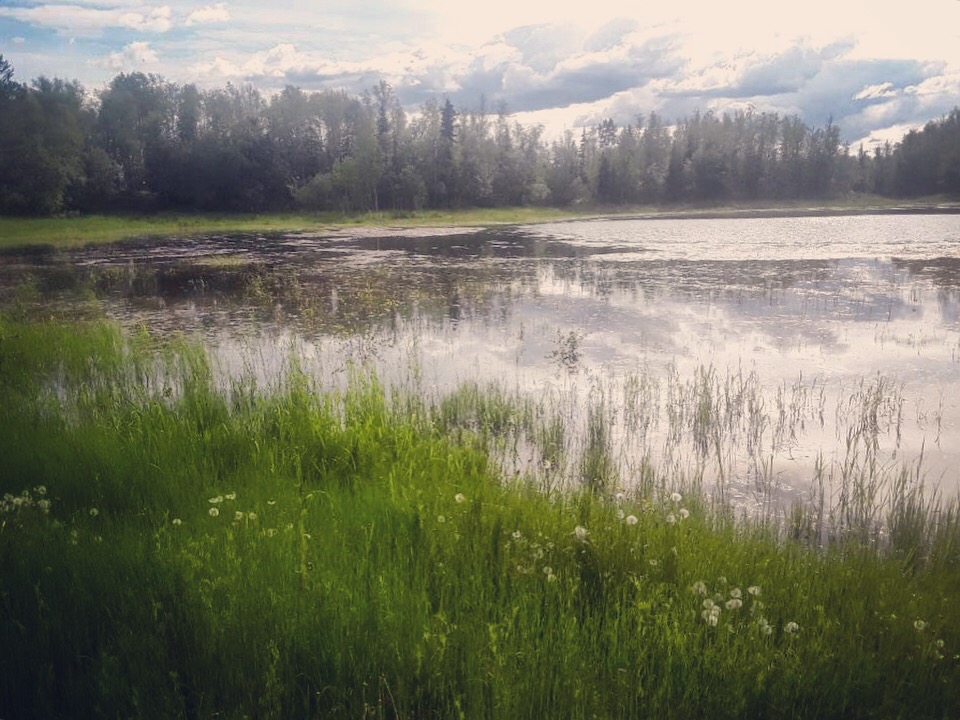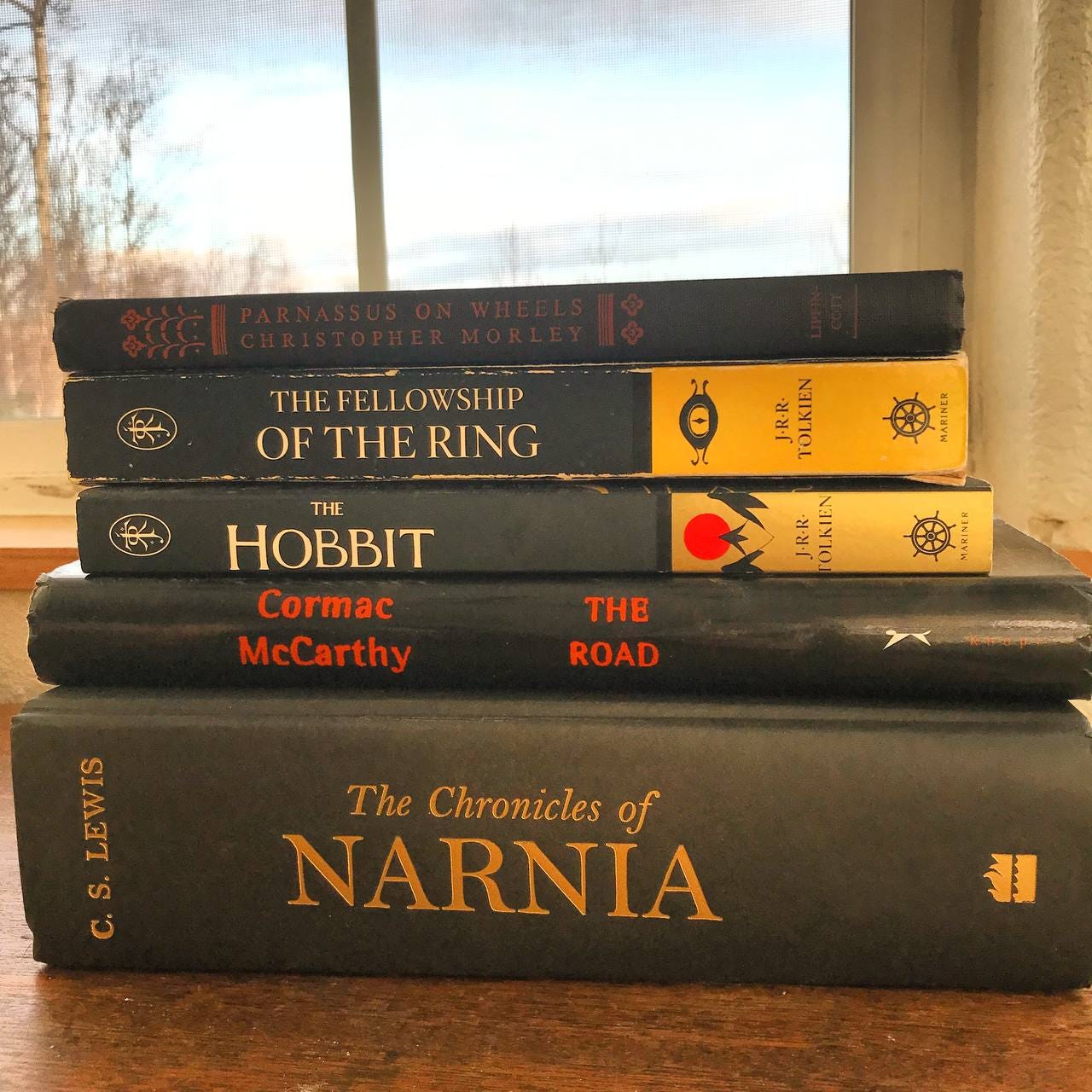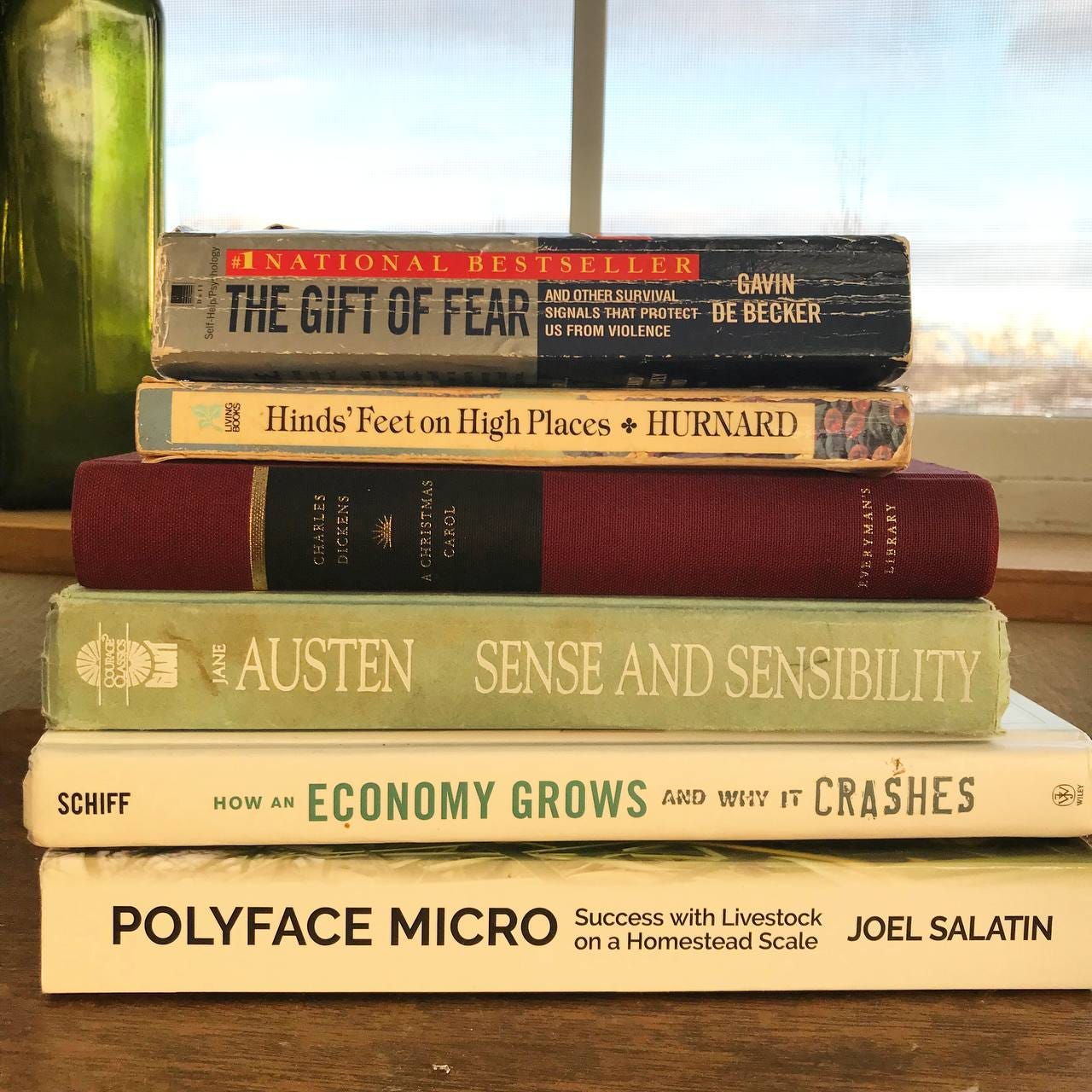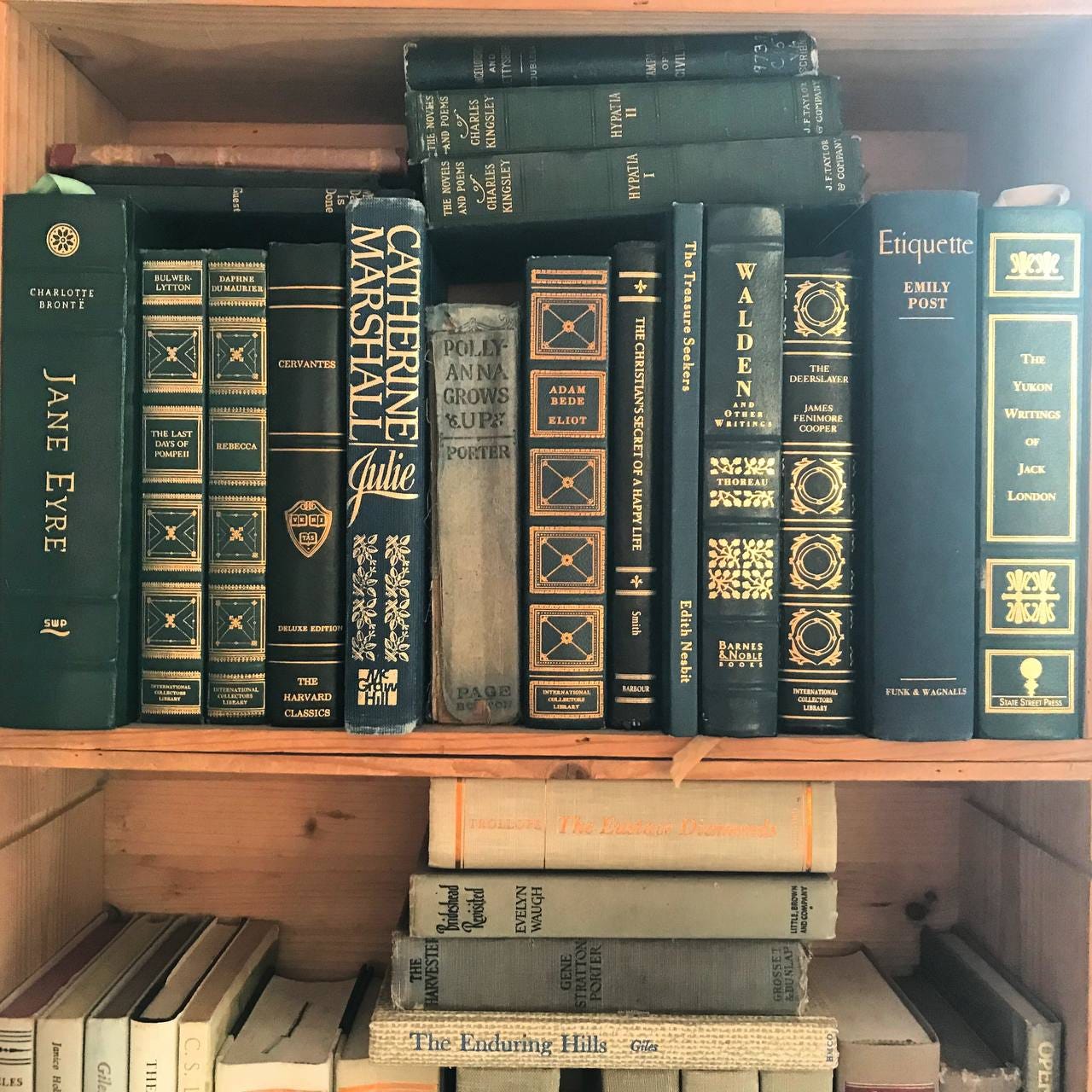We were in the middle of a windstorm that was supposed to continue all day, gusts up to 75 miles an hour. At our house on a hill they sometimes feel higher, and during that storm it wasn’t safe to walk across the yard.
I listened to the noise and could occasionally hear movement outside that was not wind, but things carried by the wind, like branches hitting the house. Snow coming loose and flying everywhere. Maybe trees falling.
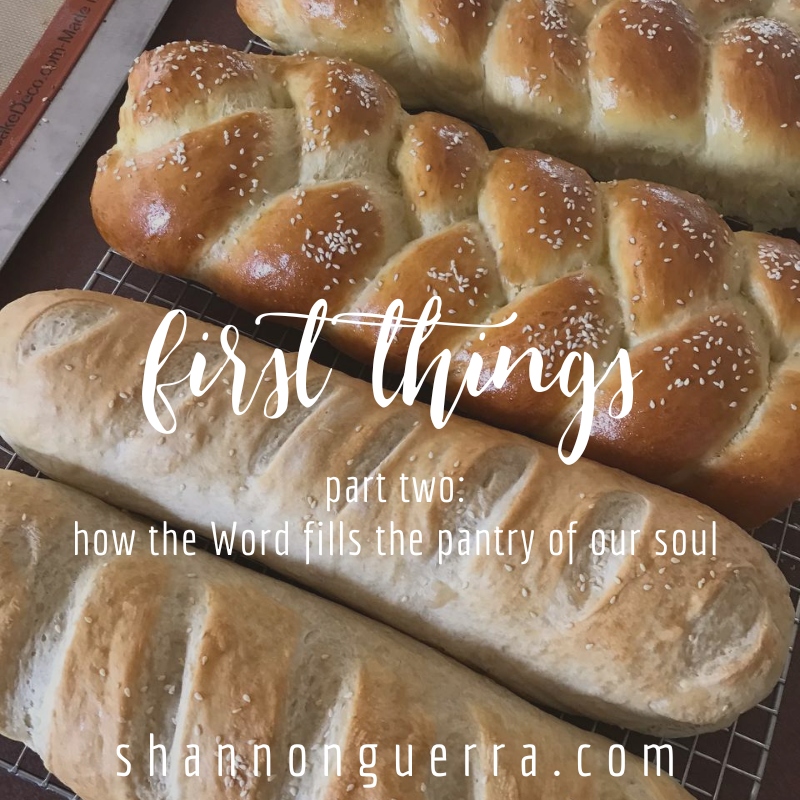
We were safe inside. We did the things we knew to do: secured everything outside, filled containers with water, charged all the things. And we’re always stocked up on the essentials. I learned years ago that I get a little edgy when we’re out of potatoes, and Vin is the same way with tortillas. Irish and Mexican, y’all.
Emotionally, in a storm, it’s our thoughts that get lifted up and blown everywhere. They fly through filled with debris and we feel the assault of worry and accusation and anger and fear. We know Jesus, we are filled with the Holy Spirit, we have charged ourselves with prayer and the Word, but the wind is blowing up against us and we can barely hear what’s true in the midst of the noise.
What do we do? We can go into our inner room.
One of our boys was reading about tornadoes this week and he was astounded at how sometimes the only thing left of a house after the storm passes is an inner closet or bathroom. Everything outside was gone, but those inner walls had been sheltered and stronger than the rest.
In these stormy seasons, we can build walls of scripture and promises around us, around our families and communities. We insulate with decrees and declarations that agree with God, barring the enemy from admittance. We intercede for those who the Holy Spirit brings to mind, and fill the cracks and crevices in their walls. We can keep the wind out, bar the lies and confusion from coming in. And also…we can command the wind to cease. If He did it, we can, too.
And he awoke and rebuked the wind and said to the sea, “Peace! Be still!” And the wind ceased, and there was a great calm.
— Mark 4:39
“Truly, truly, I say to you, whoever believes in me will also do the works that I do; and greater works than these will he do, because I am going to the Father.
— John 14:12
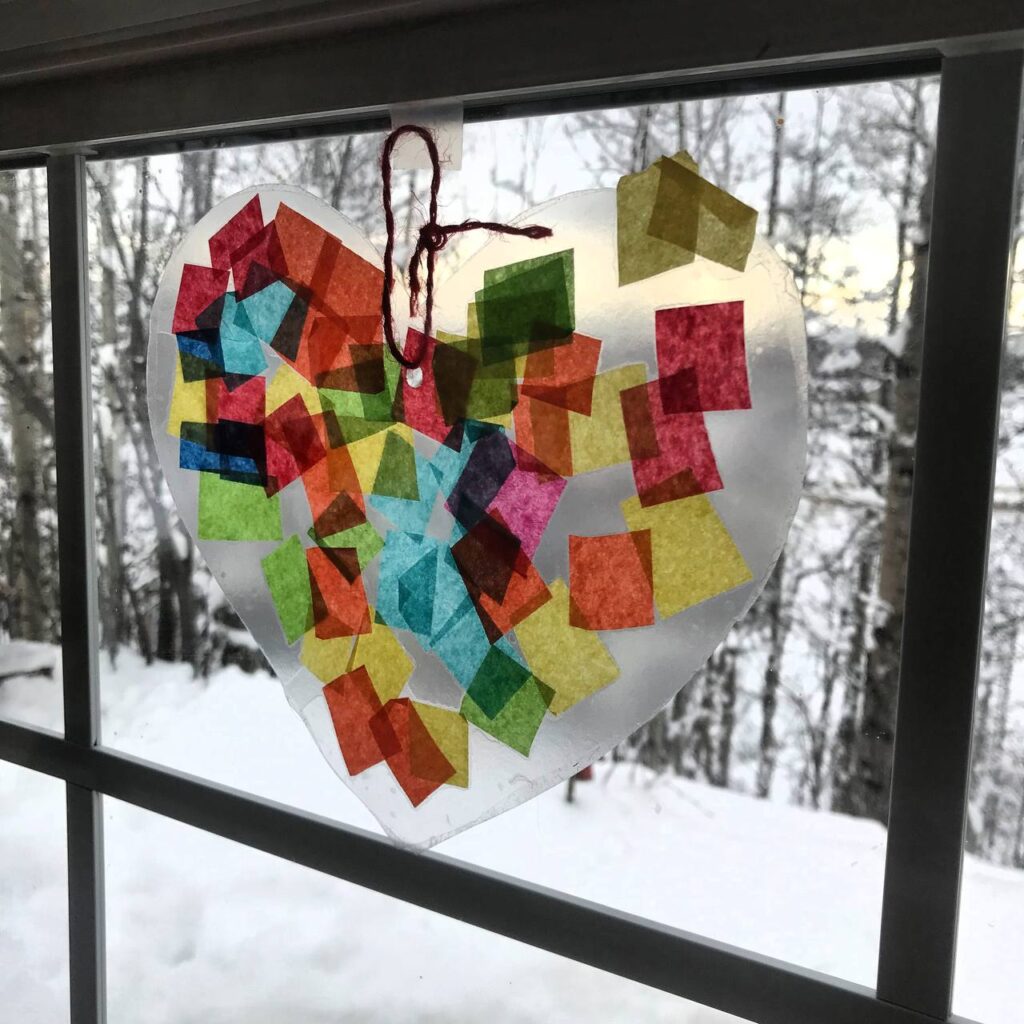
We know the Word, and we memorize the Word, and it fills the pantry of our soul. Each verse is tucked in like a jar on the shelf – light and color shining through, storing up abundance for the days to come.
My son, if you receive my words and treasure up my commandments with you,
making your ear attentive to wisdom and inclining your heart to understanding;
yes, if you call out for insight and raise your voice for understanding,
if you seek it like silver and search for it as for hidden treasures,
then you will understand the fear of the Lord and find the knowledge of God.
– Proverbs 2:1-5
This pantry is different though because when you consume it, it grows instead of getting depleted. Each verse is saved, not borrowed, never needs returning, and never runs out or goes empty. It expands the storehouse within.
Several years ago I was filling the pantry of my soul with my own copywork – because Mommy does school around here, too – and wrote passages of scripture in a notebook Iree had made for me. I stopped when it became too painful; I had postpartum eczema on my hand for years and it changed a lot of routines and things, including my handwriting. But it’s better now and I dug out the old notebook. No more excuses, I want the right walls to be stronger. I want the pantry of my soul to be filled.
…put off your old self, which belongs to your former manner of life and is corrupt through deceitful desires, and to be renewed in the spirit of your minds, and to put on the new self, created after the likeness of God in true righteousness and holiness.
— Ephesians 4:22-24
Do not be conformed to this world, but be transformed by the renewal of your mind, that by testing you may discern what is the will of God, what is good and acceptable and perfect.
— Romans 12:2
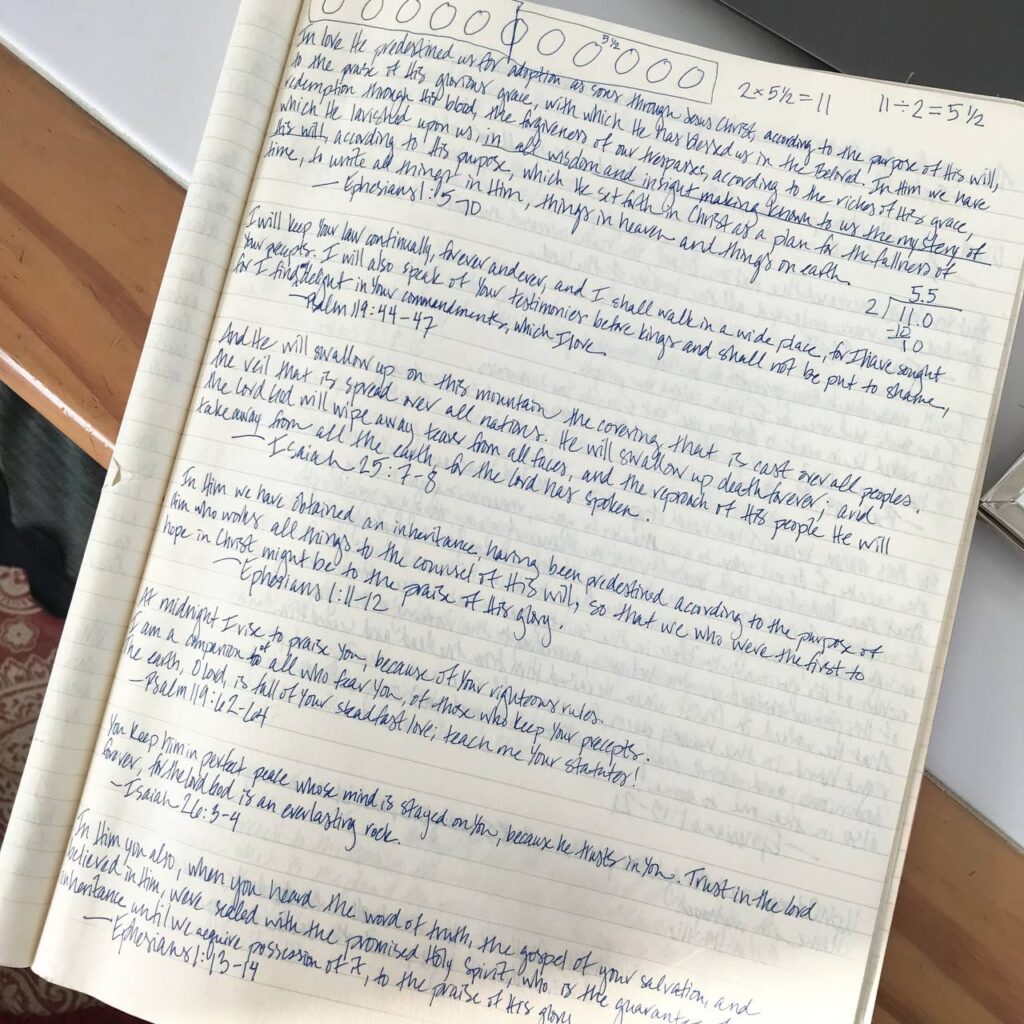
Sometimes it’s hard because so much of what we are accomplishing is invisible. It’s like we’re creating oxygen, and, well, oxygen is nice – you can’t live without it, of course – but we don’t think about breathing unless something goes wrong with the process of doing it. We don’t want to make oxygen; we want to make something with color and substance to it. So it helps for me to see these verses in my mind as I write them and read them and push through in memorizing them. I don’t like the process and repetition of memorizing, but as I do it I see in my mind jars filling with goodness in all sorts of colors.
For the Lord gives wisdom;
from his mouth come knowledge and understanding;
he stores up sound wisdom for the upright;
he is a shield to those who walk in integrity,
guarding the paths of justice
and watching over the way of his saints.
– Proverbs 2:6-8
I’ve tried a few different things lately – sticky notes on the bathroom mirror, recording short sections of scripture repeated several times in voice memos to listen to. I’m learning to ignore the enemy’s attack of boredom or annoyance with the repetition. Sometimes I share it online and encourage you guys to push play. We get the Word in, and get the junk out.
We push through and know that it is changing us. It is storing up mercy. We are filling the pantry of our soul. The Word is milk to those who are babes in Christ but meat to those who are grown, and we all need to eat.
Oh, how abundant is your goodness, which you have stored up for those who fear you and worked for those who take refuge in you, in the sight of the children of mankind!
– Psalm 31:19
I know it’s hard; there are boring sections about the census in Numbers 26 and descriptions of temples in Ezekiel and all those laws in Leviticus. But as I’m reading, the Lord reminds me that washing my face is boring, brushing my teeth is boring, writing the date at the top of a new entry in my journal is boring. But they’re necessary things. We don’t spend all day brushing our teeth, and we don’t fill the entire page by writing the date over and over. But those things have a purpose, in their own time and place. We read the Word and linger where He tells us.

Routines are good because they help us stay on track, but there will always be some days when routines go out the window. Sometimes on major holidays I barely read my Bible. I’ll start to, but get interrupted a few times, then the time gets away from me and food has to be cooked or we’re running out the door.
But I can run back to it. I can run back to the Lord and turn my attention to Him without shame or hesitation because He’s been here with me all along — He knows how the day has gone and He watched over us as it unfolded. Not finishing my planned reading doesn’t put me on the bad list for the day.
Do you need to hear that right now? Because it seems like someone does.
So, here: God is not watching for our perfection and performance. He is watching over our hearts.
On those days when there’s no quiet place to hear the words in my head as I try to read them, I could’ve yelled at my kids so I could read the Bible without interruption. And honestly, I have. Been there, done that, gotten the dummy award for it. It’s about as spiritual as my kids arguing about who’s turn it is to pray over the meal.
Sometimes we miss the forest for the trees. We try to read the Word without paying attention to what it already told us. We try to smile for the camera to make a happy memory when everyone is frustrated or angry and no one wants to record that particular moment.
We want something to look at in the future — a cute photo, a finished task — but all along, God is saying to us, Hey, Love. Look at Me.
So we do, and the other stuff falls into its rightful proportion.
The to-do list becomes less, He becomes more. And we become more right along with Him, because that is how He grows us.
He who walks righteously and speaks uprightly,
who despises the gain of oppressions,
who shakes his hands, lest they hold a bribe,
who stops his ears from hearing of bloodshed
and shuts his eyes from looking on evil,
he will dwell on the heights;
his place of defense will be the fortresses of rocks;
his bread will be given him; his water will be sure.
– Isaiah 33:15-16
The shelter becomes stronger and the storm gets quieter. The Word is living and active: when we speak it we are releasing living things, unleashing life in areas where death has tried to intrude. We speak the Word and hold the darkness at bay; we make way for those who need shelter so they can get to the door in time. The Word widens our tent pegs, expands the walls, and makes room for everyone running up the path.
Then you will understand righteousness and justice and equity, every good path;
for wisdom will come into your heart, and knowledge will be pleasant to your soul;
discretion will watch over you, understanding will guard you,
delivering you from the way of evil, from men of perverted speech,
who forsake the paths of uprightness to walk in the ways of darkness,
who rejoice in doing evil and delight in the perverseness of evil,
men whose paths are crooked, and who are devious in their ways.
– Proverbs 2:9-15
I don’t understand how Jesus makes all these wrong things right; I only know that He brings righteousness out of them. His word says so and it is the verse I will never forget: It is the signpost over our door, and the lantern we hold out to others. We obey, we water, we plant, we prune, and He fills the pantry of our soul because those who are faithful in little will be faithful in much, and He has a storehouse to feed multitudes.


